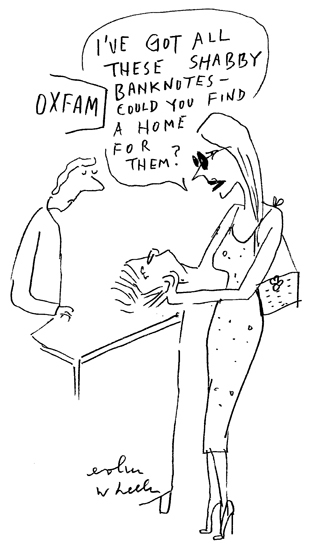Travelling the 400 miles from Glasgow to London recently, Theodore Dalrymple noticed that the roadside was littered with food and drink packaging, flapping in the wind like Buddhist prayer flags.
Roads didn’t look like that in the boyhood of Dr Dalrymple (b. 1949). Nor are they like that on the Continent. Littering, he concludes, is an unusually British disease. And the reason goes beyond mere national hygiene habits into familiar Dalrymple territory — the fall of man or, more particularly, the fall of British man, and woman.
Behind the increase in littering lies a decrease in civilisation: 36 per cent of British children never eat meals at a dining table with other members of the family. On his medical rounds Dalrymple (a doctor, criminal psychiatrist and regular contributor to these pages) found that plenty of households never cooked anything, or indeed had any cooking equipment beyond a microwave.
The collapse in home cooking has little to do with lack of money. In Dalrymple’s old neighbourhood, you could buy 20 pounds of onions for the price of a single McDonald’s hamburger. Not only are those onions better for you, and produce less packaging, but they’re also cooked at home, meaning what little rubbish they generate is confined to the private sphere — which most people are less likely to litter than public space.
In Dalrymple’s professional world, where ‘fathers or, more accurately, inseminators’ are almost completely absent, they occasionally return to the mothers of their children, expecting to be fed immediately and without warning. So, more packaged food, more microwaving.
The children are little better off. Their exhausted mothers pacify them with bad food, day and night. After a childhood with no authority, they grow up to eat packaged foods, on the move, at no fixed time, with none of the self-imposed restraint required to hold on to litter until they find a litter bin.
Dalrymple has seen middle-class postgraduate students and businessmen take the same me-first, public-tidiness-second, approach. They, too, have been degraded by a generation of litter-strewn public spaces, by a misguided expectation that the state will clear up after them, by the victory of personal selfishness over public selflessness.
Put simply, the British litter because they haven’t been socialised properly. The author — and most of his generation — don’t litter because their mothers told them not to.
Throughout, Dalrymple reacts to the outrageous behaviour of his countrymen in his familiar, cool, philosophical way. He doesn’t revel in the downfall of the poor, as he is sometimes accused of doing. He just observes unsatisfactory human behaviour in an almost scientific way, without feeling the need to sugar the pill. Unblinded by groundless optimism or the desire to be liked, he is a rare voice of truth, attacked by misguided optimists for pointing out the shortcomings of Homo Britannicus.
Only one criticism — for such a punctilious writer, so keen on clear prose and exposing garbled thought, the book is littered with typos and spelling mistakes. Surely Dr Dalrymple wouldn’t approve of such sloppiness?






Comments